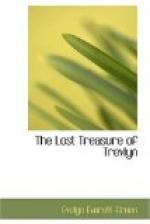It was almost at random that Cuthbert had spoken these words, but some recollection had come over him of the story he had heard of the devotion of certain gipsy people to the family of the Wyverns, and their prognostications concerning them. This woman, with the brown and crumpled skin and the beady black eyes, was very like some of those wild gipsy folk he had seen from time to time in the forest. Was it not just possible that she might be one of their tribe, who for some reason or some physical infirmity had abandoned the wandering life, and had set up for a wise woman in the heart of the great city? Was there not some strange community of knowledge and interest amongst all these wandering people? and might she not in any case know something about the families of foe and friend, and the loss of the vast treasure one day to be restored?
As his grandmother’s name passed his lips, Cuthbert was certain that he saw a flicker pass across the wise woman’s face; but she bent her head again over her bowl, and for some minutes remained in deep silence. Then she looked up and scanned his face again.
“Let me see thy hand,” she said.
He held it out fearlessly, and she bent over it for some time.
“It is a good hand,” she said at length, “and its owner may look for prosperity in life, But he must heed one thing, and that is his own over-bold rashness. He must beware of trusting all men. He must beware of fatal fascination. He must beware of a darkly-flowing river, and the dark cellar beyond. He must have the courage to say ’nay’—the courage to fly as well as to fight. Young man, thou hast over-much curiosity. In these times of peril men must walk warily. Choose the safe path, and keep therein. Think not to play with edge tools and yet keep thy fingers unscarred.”
Cuthbert felt the colour rising in his face. He felt the home thrust embodied in these words. He knew that they were a warning addressed to that side of his character which urged him to make friends on all sides, and strive to see good in all men, and to avoid joining himself to any one party in Church or State whilst in measure belonging to all. For a man of quality he knew such a course would be impossible and foolishly perilous, but he had felt secure in his own insignificance. He, however, well understood the warning, and so he marked the words about the flowing river and dark cellar, and though by no means understanding them now, he resolved that he would not forget.
But Cherry was shivering with excitement, and at last she could keep silence no longer. The wise woman had been kind to her before; surely she would not resent it if she spoke now.
“But the treasure, mother, the treasure,” she urged. “Canst not thou help us there?”
The old woman shifted her bright eyes to the flushed face of the girl, and a flicker passed over her face as she repeated:
“Us—us? And what part or lot has Martin Holt’s daughter in the lost treasure of Trevlyn? What, my pretty child, has thy handsome lover come so soon? and art thou looking already to be made a lady of by him?”




